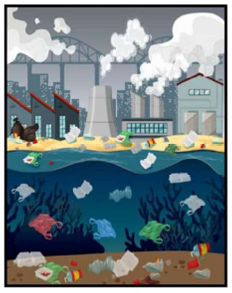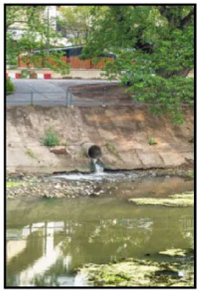Name of the project:
Visit in a town/city in a nearby locality suffering from the problem of water pollution. Find out
the causes of water pollution and suggested remedies.
Need/Importance of the project:
i) Addressing water pollution is vital for safeguarding public wealth in Virar, Maharashtra.
ii) Protecting local water sources is crucial for maintaining ecological balance and biodiversity.
Hypothesis:
i) Industrial discharges may contribute to water pollution.
ii) Inadequate waste disposal systems might be a key cause of water
contamination.
Materials and apparatus:
Containers, gloves, labels, pH metre turbidity metre, chemical test kits.
Work plan:
i) Research water pollution sources in Virar.
ii) Collect water samples from identified areas.
iii) Conduct initial water quality test.
iv) Analyse results, form hypothesis.
v) Developed a detailed procedure for water pollution assessment.
Description of actual procedure:
i) Identify polluted sites through field surveys, considering
industrial zones and waste disposal areas in Virar.
ii) Systematically collect water samples, noting location, time
and environmental conditions to ensure representativeness.
iii) Utilise sterile containers to prevent contamination during
sample collection from various sources.
iv) Conduct on-site tests for immediate observations, including
visible inspection for floating debris or unusual colorations.
v) Transport samples to a control environment for further
testing, minimizing external influences on the collected water.
vi) Use precise tools such as pH metres, turbidity metres and
chemical test kits for comprehensive water quality analysis.
vii) Record detail observation of physical characteristics,
odors, and any anomalies is during the testing process.
Observations:
i) Industrial zones, distinct chemical odors were noted, indicating potential
water contamination.
ii) Visual inspection revealed floating debris and oily residues near
identified waste disposal sites.
iii) pH levels varied significantly, with industrial areas executing higher
alkalinity compared to residential zones.
iv) Turbidity levels were notably elevated in areas near factories,
suggesting suspended particles in the water.
v) Colour variations in water samples hinted at potential
chemical pollutants, demanding further analysis.
vi) Aquatic life showed signs of distress, emphasizing the
ecological impact of water pollution.
vii) Local community wealth displayed concerning levels of
contamination, posing risks to public health.
Data analysis with the help of tables/graphs.

Inferences:
i) Industrial discharges contribute to elevate pH levels.
ii) Inadequate waste disposal leads to increased turbidity and
chemical contamination.
iii) Aquatic life is adversely affected by water pollution.
Suggested measures:
i) Enforce stricter industrial effluent regulation .
ii) Improve Waste disposal infrastructure.
iii) Promote community awareness on responsible water use.
iv) Implement regular water quality monitoring.
v) Collaborate with local authorities for effective Pollution control.
Acknowledgement:
I express my sincere gratitude to my science teacher for invaluable
guidance, offering insights into effective research methodology and
environmental science principles.
Special appreciation goes to the local community of Virar for their
cooperation, sharing invaluable local knowledge and emphasizing
the agency of addressing water pollution issues.
I extend heart felt thanks to environmental experts who generously
contributed their expertise, validating observations and in reaching
the project with their insights.
Requirement diagrams/photograph:
